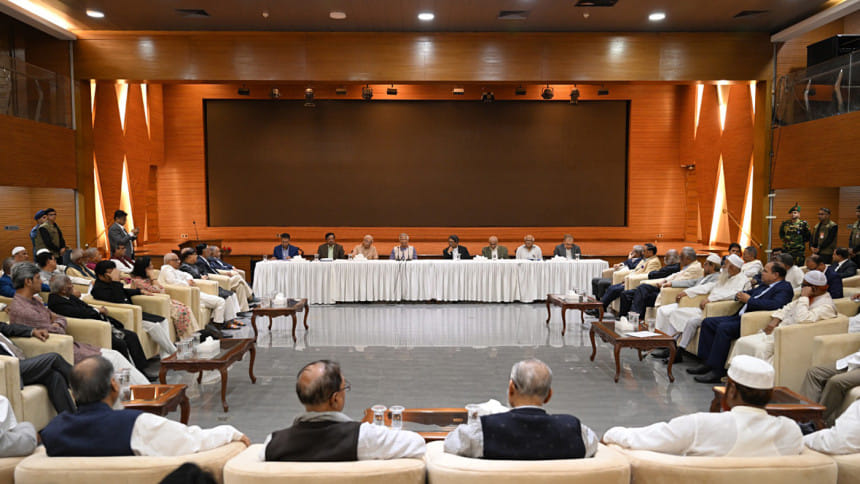Can the consensus commission break the deadlock?

Bangladesh stands at a pivotal moment in its political history, with plans to make democratic institutions functional and curb the risk of a return to autocracy.
At the centre of this initiative is the National Consensus Commission, which is working to build agreement among the country's political parties on key reforms.
These proposals—formulated by five commissions—focus on the constitution, judiciary, electoral system, public administration, and anti-corruption mechanisms.
In a country where political consensus has historically been elusive, the commission has held its first round of discussions with 33 political parties separately on 164 key recommendations.
Yet again these talks have revealed entrenched political rivalries and deep ideological divides.
One key area of consensus among political parties is the reinstatement of the non-partisan caretaker government system. While a majority supports its return, sharp disagreements persist regarding its formation, duration, and particularly the process for appointing the chief adviser of the caretaker government.
Equally contentious is the proposal to establish a National Constitutional Council to oversee major state appointments, including that of the chief adviser, who will head of the election time caretaker government. Proponents argue that such a body could help dilute the concentration of executive power, especially that of the prime minister.
Under the current constitutional framework, the president—except in appointing the prime minister and chief justice—is obligated to act on the prime minister's advice, granting the executive considerable control over appointments.
Other reform proposals have also sparked mixed reactions. These include limiting the prime minister's tenure to two terms, preventing any individual from simultaneously holding the positions of prime minister, leader of the parliament, and party chief, and a bicameral legislature, with a 100-member upper house. While the idea of a bicameral legislature has gained traction, debate continues over how members would be elected—whether by direct or indirect votes, or a hybrid system.
Reform of Article 70 of the constitution—currently prohibiting members of parliament from voting against their party—is another critical issue. Many support granting MPs more freedom, but argue that voting against the party line should remain prohibited in case of finance bills, no-confidence motions, and constitutional amendments.
Parties also expressed diverging views on other proposals like amending laws to bar individuals accused of war crimes from contesting elections and "pluralism" as a fundamental principle of the state.
These disagreements once again show how much the country's political parties are divided ideologically.
Bangladesh has found itself poised at similar critical junctures before, and faltered.
The first opportunity for democratic consolidation was lost soon after independence, when a one-party system was introduced. That period was followed by a series of coups and military regimes.
The second chance came after the fall of the Ershad regime in 1990. The then interim government created 29 task forces in 1991, and over 250 national experts prepared reform plans across sectors including the economy, environment, energy, and politics. But those reports were ultimately shelved by successive governments.
Political parties have broken their promise and failed to fulfill the 'Tin Joter Ruprekha' (roughly translated to the Tri-alliance Outline), agreed to at the final stage of anti Ershad protest which aimed to establish a permanent democratic order.
Now, the country faces its third and arguably most critical chance. Failure to forge a comprehensive agreement could deepen polarisation, erode trust in political parties, and eventually stall the democratization process once again.
Reform must not be reduced to a zero-sum game of power redistribution. Rather, it should aim to build a transparent, accountable, and inclusive system—one that prevents the drift toward autocracy and reflects the aspirations of the Bangladeshi people.
Unless political leaders rise above narrow partisan interests and embrace a spirit of compromise, the Consensus Commission's efforts may grind to a halt.
The stakes are too high to let this moment slip away. For Bangladesh to chart a democratic future, political parties must acknowledge the weight of history, act with responsibility, and commit to building a shared national vision.
Thus far, the interim government, through the commission, has listened to parties separately. Today it begins joint meetings with all parties. Instead of repeated discussions with separate groups, a collective dialogue should streamline the process and accelerate resolutions.
When parties engage in discussions together, they gain a clearer understanding of each other's positions, concerns, and priorities, which can encourage compromise, and in turn lead to a lasting democratic dispensation.

 For all latest news, follow The Daily Star's Google News channel.
For all latest news, follow The Daily Star's Google News channel. 



Comments